- Home
- Tony Abbott
Denis Ever After
Denis Ever After Read online
Dedication
TO MY SISTERS
ARLENE AND BEATRICE
APRIL 30 1958–MAY 2 1958
Contents
Cover
Title Page
Dedication
1. Heaven or Whatever
2. What Russell Says
3. It’s All One Big War
4. Mad Matt
5. Home Fires
6. The Unfinished Work
7. Remember Me
8. The Purpose of Death
9. Counterattack
10. The Razor
11. Buckwood
12. A Twin and His Solo
13. Trey Is Trey Is Trey Is Trey
14. Me and My Halo
15. Brothers
16. Geegee’s Advice
17. The Hurt of Night
18. The Big Ask
19. Dragging Away
20. The Unfinal Resting Place
21. Valdosta
22. The Gray Stone
23. By the Roadside
24. The Big Dipper
25. Wooden Bones
26. A Boy Thing
27. Motoring Away
28. Them Kidnappers
29. In the Boondocks
30. At Cabin Seven
31. I’m Sorry for Your Loss
32. Thass Me. I’m Melrose.
33. If Anybody Asks You Where I’m Going
34. October
35. The Lake That Is Silver
36. In Cold Water
37. Iron November
38. The Place I Used to Be
39. I Fell Asleep
40. Missing Someone
41. A Town Called Zelienople
42. City of Rust
43. Killer
44. The Ashes of Joseph Egan
45. Flights of Angels
46. One Last Thing
Egan Family Tree
Acknowledgments
About the Author
Books by Tony Abbott
Back Ad
Copyright
About the Publisher
1
Heaven or Whatever
So this morning I’m taking a slow glide with GeeGee down to the shore and she tells me right out of the blue how it’s almost five years since I died. GeeGee is my great-grandmother, and she says it like it’s nothing.
“Five years.”
We pause on the sidewalk. “Really? Five whole years?”
“Russell told me.”
Russell is GeeGee’s friend. Russell isn’t magical or anything. He just writes stuff down.
“Thanks,” I tell her. “I guess I forgot.”
“Oh, Matt! A joke this early in the day!”
I’m not Matt. I’m Denis, Matt’s twin brother. Matt is alive and twelve now. I’m one of those, but not both.
GeeGee tugs my arm when I correct her. “Denis, of course.” We cross Water Street and start into the gently winding route to the harbor. “You begin losing it right away, don’t you?” she says. “Your memory. I believe I’m around twenty-nine now.”
She’s not. She’s over eighty. Maybe near ninety. GeeGee died when Matt and I were tiny, and she sometimes confuses me with him. Which is funny because people did that all the time when I was alive.
I drown and float and drown and float.
I love GeeGee; she’s taught me so much about life and about being up here, but I think she’s slipping away big-time, forgetting things more quickly than ever, which, believe it or not, is what you’re supposed to do when you get to Port Haven.
I shiver among the yellow leaves.
For the last five years I’ve been on the road to becoming clean, too. Being clean is the total point when you die. You clear your life out of your system like, well, your food when you have a stomach bug. You shake off the heaviness, you become air.
I have a handful of memories of my family. My mom’s smile, her wavy brown hair; her not hugging me so much, but my feeling warm and soft when she did. Dad was quiet as a stump in the morning, then told off-the-wall jokes at supper, like he was two different people. Maybe it was the afternoon beers he drank, but whatever. He taught me how to bike and play ball and other stuff. Mostly, I remember my brother, Matt, who I’ve known longer than anyone, because, obviously, we were born together.
GeeGee did get it right about forgetting. From the second we enter Port Haven, we start forgetting our lives. We do it in reverse, from the last moment we breathed real air to the very beginning, until basically we become unborn.
From the dark, the darker darkness rises.
And there is silver.
Naturally, where and when and how we died are the first things we forget. This is probably a good thing, because who’d want to remember dying? With the gasping and the leaking and the fluids and all? Even if you go quietly in your sleep, it can be a bit disgusting. And if you died violently, no way do you want to hold on to the fear and confusion and pain.
How I died is almost a total blank. Almost. I think there were yellow leaves. Fuzzy flakes crisscrossing a big shadow in my left eye. Something silver. All in all, not very much.
I should say that once you get completely clean, you leave here for Garden Hills. It’s somewhere up beyond the slopes from where I am now. Nobody says much about Garden Hills because you don’t come back from it. All I really know is that you come to Port Haven, you forget forget forget, then you go up there.
For . . . ever!
GeeGee walks to the shore each day to welcome the dinghies and kayaks, battleships and cruise liners that dock here with each new batch of souls. It’s how I first met her. When I paddled ashore (it was a slow death day) I was seven and didn’t know anybody. I never knew her when I was alive, but GeeGee welcomed me and was nice and became my closest friend here.
That’s one of the great things about Port Haven. You get to know people you didn’t when you were alive, and they’re all pretty nice to you. Strolling the streets with GeeGee like I am now makes me feel warm inside. She gives off a scent like a just-peeled orange. It’s a happy smell. And she has a glow, soft and almost musical, that she wraps me up in. GeeGee makes me feel safe.
Myself, I don’t normally watch for boats. I’m not expecting anyone. But I’m heading to the shore today because, over the last week, I’ve been attacked by noises clawing the inside of my head. After five years with GeeGee I was just getting to where I was clearing out and calming down. I was on track. The yellow leaves and the thing in my eye were getting so I almost didn’t think about them anymore.
Then this horrible scratching begins, like tree branches tearing at your window in a storm. Like fingernails scraping through a layer of paint and showing you what lies beneath.
“It means someone has unfinished business with you,” GeeGee said as she sat with me on my porch swing this morning. “Your mother, maybe. Or your father. Or the postman, your priest, a teacher, or the president.”
I rubbed my eyebrow and smirked when she told me that. “I thought we’re supposed to be about that. Haunting them and all.”
GeeGee giggled then. “Ironic, isn’t it?”
2
What Russell Says
I should say that Port Haven is laid out sort of like a small town, with low houses and trim lawns and shade trees. Everything’s crisp and neat. There’s lots of sun, the air is fresh and warm, and it’s always summer but not hot summer. Early June. I like that, because it’s kind of the opposite of how Pennsylvania was the November I died. November 20, two days before Thanksgiving. I only know the exact date because Russell wrote it down and told GeeGee, and she told me and I remember it.
It’s complicated, but Russell once said that the instant you die, living people start to forget about you—they can’t really help it—wh
ich actually jump-starts you forgetting about yourself. You keep forgetting and forgetting until your whole self fades peacefully, “like mist in the sun.”
Unless, of course, you try not to leave, or you remember too much, or you visit the living too often. Then, Russell says, you get ripped away from here. And it hurts. “They scream, those souls do, who remain too long. You feel them getting pulled apart. Ripped right down the center!”
Icky, right?
Russell also says that the reason I’m twelve now and not still seven, which I was when I died, is because I’m a twin. As Matt ages, he keeps imagining me doing stuff with him, so even though I’m dead up here, I get older along with him—in his mind—down there. That’s probably also why I’m not fading as quickly as most people. Russell says that some souls manage to stay here years and years, either because they’re too famous to be forgetten or because they’re waiting for someone to arrive and refusing to leave until that happens.
Maybe the most important thing Russell says is that there are bonds between all of us, the living and the not. There are, he says, “a thousand, thousand threads,” binding us all in different ways, but we hardly ever realize it. “Sometimes two colors come together unexpectedly, crossing and tangling and weaving at a point no one suspects. Patterns are woven,” he says, “patterns are woven and repeated, subtly or accidentally, over time and space, over many years and many places.” That’s all very nice, but once a thread begins to fray, the big weave loosens, and the countless threads between the living and the dead begin to pull apart.
Bottom line: after we die, you people don’t remember us so much, then we forget, then we fly away to the far north, where we stay ever after. The way we’re supposed to.
3
It’s All One Big War
GeeGee and I arrive at the water. A handful of people—most old, a few young—are playing volleyball on the beach.
“There’s Elly or whoever,” I say. “As usual.”
Every time I come down here there’s a girl with a crooked ponytail, building a sandcastle by herself. No one’s real sure of her name, but she’s almost eight, Russell told me, and I always see her playing by the water, facing the sea. No one’s ever with her, and I’ve never actually spoken to her, but GeeGee tells me she’s down here every day. Right now, Elly or Ellen or Ella stands.
“Looks like a warship coming in,” GeeGee says.
It’s an aircraft carrier the size of a floating city, and it’s packed with soldiers in all different kinds of uniforms, some bearded in robes and scarves. There are mostly men, although there are more women than I would have thought. Boys and girls too.
“Must be another war somewhere,” I say.
“Oh, Danny, it’s all one big war.”
GeeGee glances back to the veranda of the beach house. Russell’s there, talking to a guy in a baseball cap who he told me once is always asking questions about his two sons.
Russell likes family stories, and, if you think about it, what isn’t a family story? At the moment he’s got his feet propped on the railing, lounging in a slanted wooden chair, his usual position while listening and scribbling notes for the book he’s writing.
As you can probably guess, he calls it A Thousand, Thousand Threads.
GeeGee reaches up to smooth my left eyebrow, but she can’t hide the nick in it. “Shall we ask Russell about your noises before you go off and hurt yourself? He knows oh so much.”
It’s not well known, but we have two ways to visit the before place. Variety is the spice of death, they say. One method gives us pretty bad headaches. The other does something much worse. I go for the headache today.
“You know, GeeGee, I gotta see what it is myself. I’ll do the grotto, find out what I can, then ask Russell if I have questions.”
“You can go on your own, then? I remember the grotto being somewhat unpleasant.”
“I’m good, GeeGee. See you in a bit.”
Just east of the harbor lies a craggy place with a natural arch, where water flows deep under the rocks. I don’t know what its real name is, but we call it the grotto. There’s a sort of swirling mist in there, eerie and mysterious, but if you stare into it hard enough, you can see the other side, your side. I climb down the rocks, focus, and try to burn through the fog, like I have X-ray vision. Zzzz! My head instantly starts throbbing, but after a minute, the mist begins to thin.
I see a room. A school classroom.
There’s a broad oak desk with a man in a sport jacket standing behind it. He’s pressing his hands flat on the desktop. His face is red. His hair is disheveled. His glasses are slipping down to the tip of his nose.
Teetering in front of the desk is a student with long hair. I ease around to the side to see the kid. My heart does a little skippy thing.
The boy’s features are identical to mine. His mouth is hanging open. He’s trembling, like he’s going to explode.
He’s my brother, Matt.
4
Mad Matt
Because visiting the before place slows down the process of “getting clean,” I haven’t really looked in on my brother. It’s not forbidden—hey, we have free will here—but, as Russell points out, it’s not encouraged. So when I see Matt after five years, I’m stunned. He has long hair, his face is narrow and pale, and he’s got pimples, which, lucky me, I never did.
Matt is mumbling at his teacher—“I . . . I needed to . . . There was . . . See”—but mostly he’s just shaking, not making sense. Plus, he’s waving around a roll of papers like a lightsaber.
Yes, I remember Star Wars. This is death, not 1950.
There are sparks shooting out of Matt’s face, his head and shoulders. No one can see them but me, these bolts of energy. They’re what people are feeling, their emotions. Everybody has sparks, but only souls can see them, and right now, Matt is an exploding weapons dump. His teacher just takes it, waiting for the end of Matt’s nonsensical word salad.
Of course, I can hear what my brother is actually trying to say. His words are jumbled, but because I’m dead and his twin, I understand, just like I can see the energy he’s spraying off.
What he’s saying is exactly what he’s been grinding into my head for the last week, and I finally hear it in words.
“Denis! My dead brother! Denis!”
I’m like, Seriously? You just realized I’m gone?
Anyway, the sight of this standoff is freaking the class out. They’re in various stages of shock or disgust. All except one kid, who’s not shocked but concerned, really worried.
This kid is a boy. Or maybe a girl. Honestly, this person could be either. The face has smooth cheeks, a thin nose, large brown eyes, pink lips, short hair. I read off a paper on the desk that its owner’s name is Trey, but since I really can’t tell whether Trey is a boy or a girl, I won’t say he or she, I’ll just call Trey Trey, and see how that works.
So while Matt continues his garbled croaking, and the teacher continues to keep his cool, Trey gets up from Trey’s seat. Or almost gets up. Just sort of hovers, halfway standing, leaning, almost reaching for Matt, until the girl in the desk behind yanks Trey by the belt loop.
“Don’t,” the girl whispers. “You’ll get in trouble like last time.”
I find I can read Trey, too. This is one of the absolute niftiest features of being a spirit because it really helps fill in the context. It turns out “last time” was a stormy day last week—right when the scritching and scratching in my head started, by the way—when Matt angrily threw a pencil, and it turned out to be in the general direction of a teacher. That teacher didn’t coolly wait for Matt to exhaust himself. That teacher got angry, and when Trey scooted up to be with Matt, the teacher took the move as joining the rebellion, and they both got detentions. Our parents and Trey’s dad had to come to school.
But this time, no.
Trey allows the girl in the seat behind to tug on the belt loop until Trey sits back down.
Finally, this teacher is pretty awesome a
bout the whole business. “I’m sorry,” he calmly says three times, “but, Matt, you shouldn’t have been in the teachers’ lounge. And certainly not to use the copier. For now, please sit. We’ll discuss it later.”
The other students give the teacher a quick round of applause. I clap too, but there’s no sound when I do it. Finally, the bell rings and the kids empty out. Matt lingers to talk to the teacher, but the teacher just waves him out.
“Don’t do it again,” he says. “And calm yourself down. Please.”
“Thanks,” Matt replies, his first intelligible word.
In the hall Matt and Trey immediately start whispering in each other’s ears. They’re zingy. On the scale of sparks, zingies are a strange kind of intense blue, which means you’re deep, deep friends. The two of them rub shoulders in the hall and bump each other when they don’t have to. Most kids don’t give them a second look, while others stare at them, like they’re not sure about it. Matt and Trey don’t seem to care either way.
It’s right about then that I feel my eyes go out of focus—visiting gives you such a brain pain, you can’t do it for long—and I’m back at the grotto, the morning sun in my face.
GeeGee is standing next to me. She smiles and places her hand on my forehead, which she likes to do now and then to check on me. “I’m sorry I fell asleep. Do you feel better?”
“Me? I’m okay. It’s my brother. For some reason Matt is all about me after five years.”
“If he thinks about you so much, you should go to him for real.”
“I don’t know, GeeGee, the grotto is bad, but the way people talk about the razor scares me.”
The razor, you should know, is our other way to visit your world.
“Besides, it’s dangerous, isn’t it?”
She wrinkles her nose. “He’ll keep bugging you until you have to go. I did it once or twice, it’s nasty, but you’re young and you’ll survive. The razor’s the only way to actually talk to him.”
Sure enough, like with most things GeeGee tells me, she’s right. Before the day is over, Matt’s scraping has turned to moaning, and the moaning to screaming, and the screaming to shrieking.

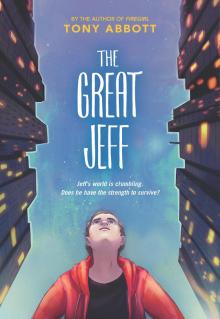 The Great Jeff
The Great Jeff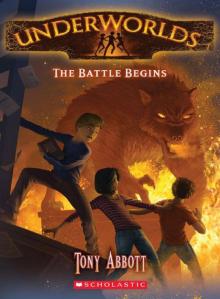 Underworlds #1: The Battle Begins
Underworlds #1: The Battle Begins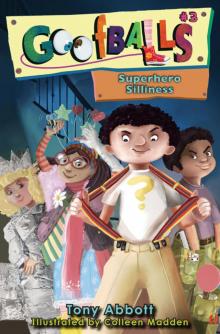 Superhero Silliness
Superhero Silliness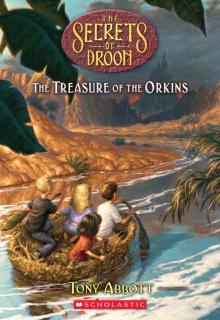 Treasure of the Orkins
Treasure of the Orkins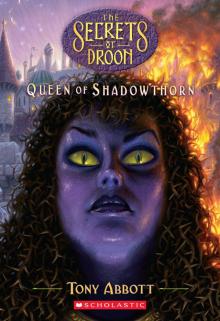 Queen of Shadowthorn
Queen of Shadowthorn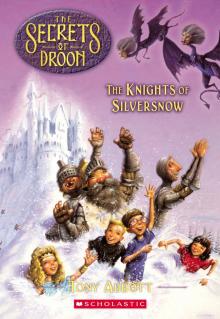 The Knights of Silversnow
The Knights of Silversnow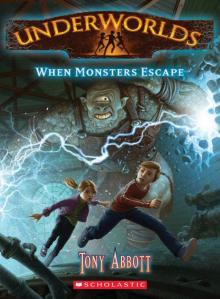 Underworlds #2: When Monsters Escape
Underworlds #2: When Monsters Escape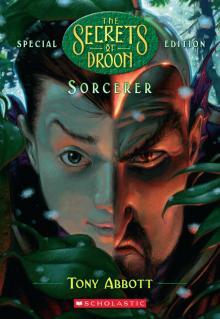 Sorcerer
Sorcerer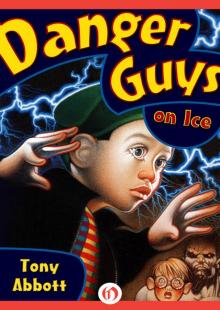 Danger Guys on Ice
Danger Guys on Ice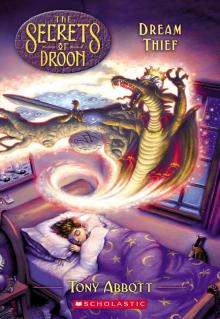 Dream Thief
Dream Thief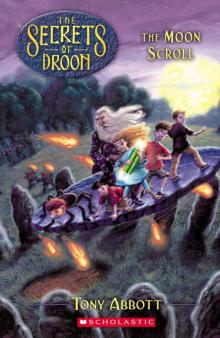 The Moon Scroll (The Secrets of Droon #15)
The Moon Scroll (The Secrets of Droon #15)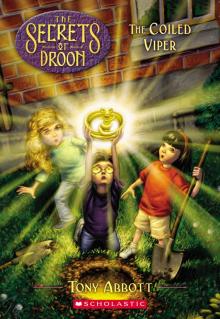 The Coiled Viper
The Coiled Viper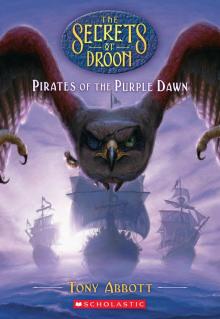 Pirates of the Purple Dawn
Pirates of the Purple Dawn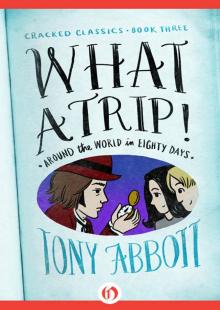 What a Trip!
What a Trip!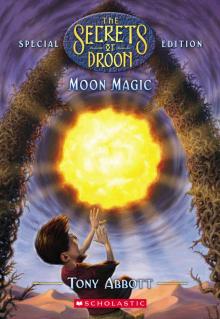 Moon Magic
Moon Magic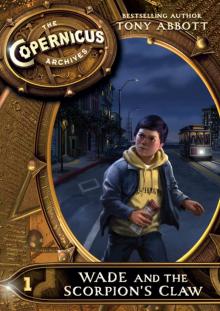 Wade and the Scorpion's Claw
Wade and the Scorpion's Claw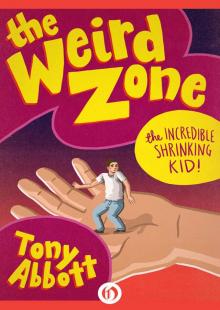 Incredible Shrinking Kid!
Incredible Shrinking Kid!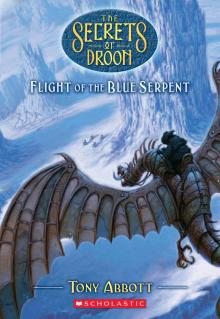 Flight of the Blue Serpent
Flight of the Blue Serpent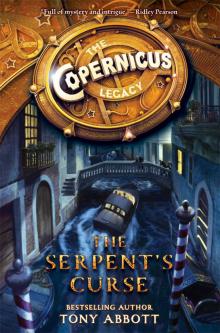 The Serpent's Curse
The Serpent's Curse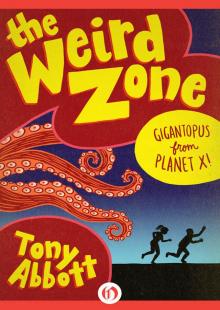 Gigantopus from Planet X!
Gigantopus from Planet X!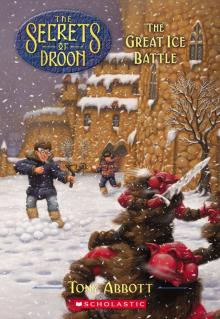 The Great Ice Battle
The Great Ice Battle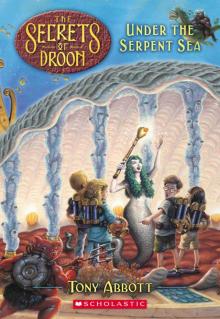 Under the Serpent Sea (The Secrets of Droon #12)
Under the Serpent Sea (The Secrets of Droon #12)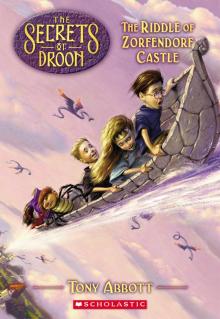 The Riddle of Zorfendorf Castle
The Riddle of Zorfendorf Castle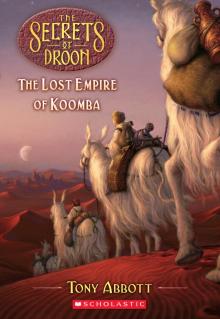 Lost Empire of Koomba
Lost Empire of Koomba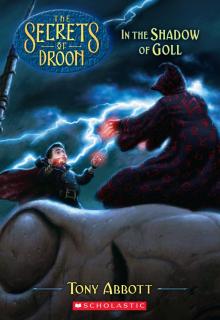 In the Shadow of Goll
In the Shadow of Goll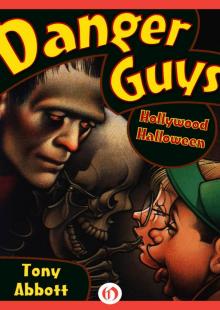 Danger Guys
Danger Guys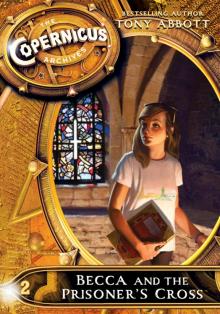 The Copernicus Archives #2
The Copernicus Archives #2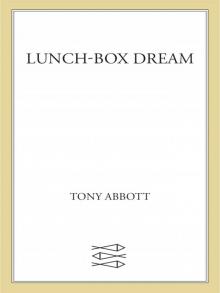 Lunch-Box Dream
Lunch-Box Dream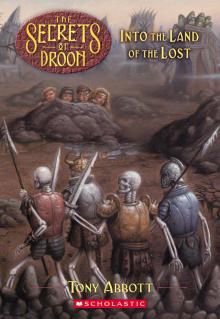 Into the Land of the Lost
Into the Land of the Lost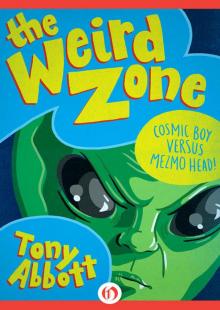 Cosmic Boy Versus Mezmo Head!
Cosmic Boy Versus Mezmo Head!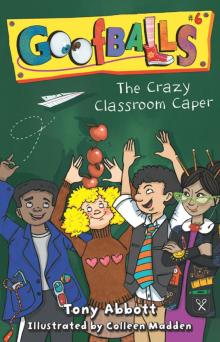 The Crazy Classroom Caper
The Crazy Classroom Caper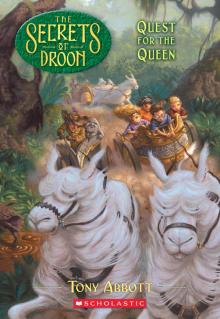 Quest for the Queen
Quest for the Queen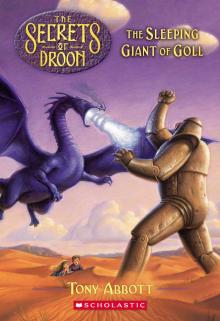 The Sleeping Giant of Goll
The Sleeping Giant of Goll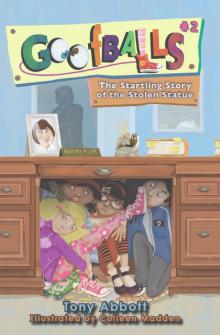 The Startling Story of the Stolen Statue
The Startling Story of the Stolen Statue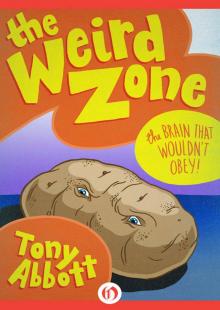 Brain That Wouldn't Obey!
Brain That Wouldn't Obey!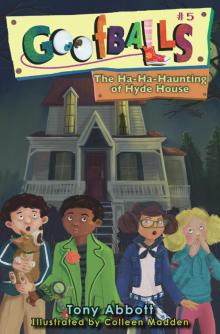 The Ha-Ha-Haunting of Hyde House
The Ha-Ha-Haunting of Hyde House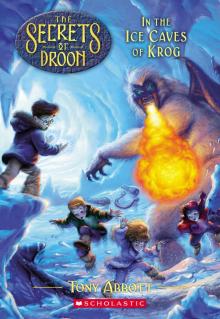 In the Ice Caves of Krog
In the Ice Caves of Krog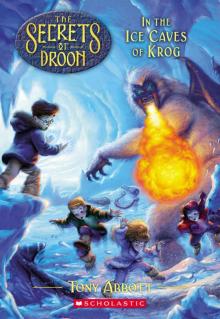 In the Ice Caves of Krog (The Secrets of Droon #20)
In the Ice Caves of Krog (The Secrets of Droon #20)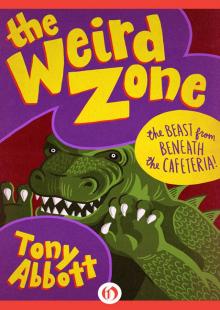 Beast from Beneath the Cafeteria!
Beast from Beneath the Cafeteria!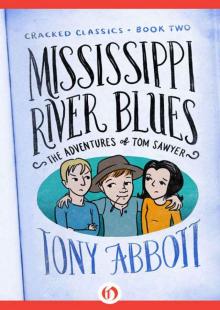 Mississippi River Blues: (The Adventures of Tom Sawyer) (Cracked Classics, 2)
Mississippi River Blues: (The Adventures of Tom Sawyer) (Cracked Classics, 2)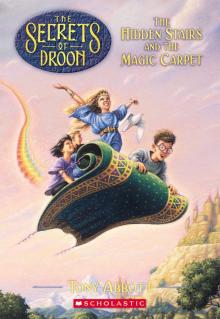 The Hidden Stairs and the Magic Carpet
The Hidden Stairs and the Magic Carpet The Mysterious Island
The Mysterious Island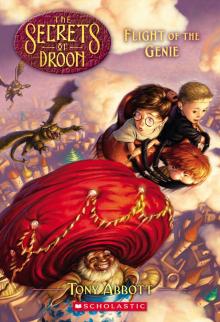 Flight of the Genie
Flight of the Genie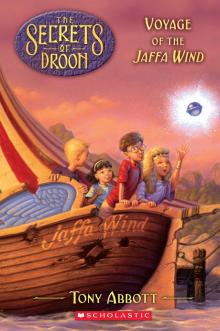 Voyage of the Jaffa Wind
Voyage of the Jaffa Wind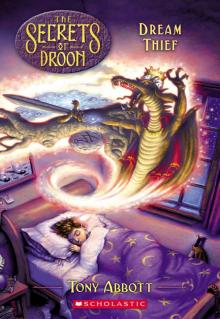 Dream Thief (The Secrets of Droon #17)
Dream Thief (The Secrets of Droon #17)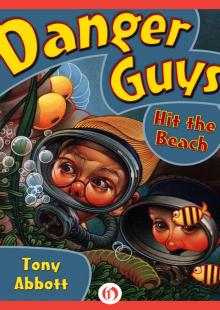 Danger Guys Hit the Beach
Danger Guys Hit the Beach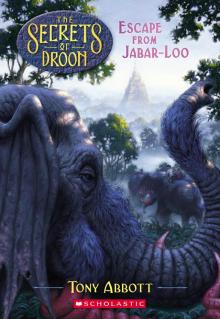 Escape from Jabar-loo
Escape from Jabar-loo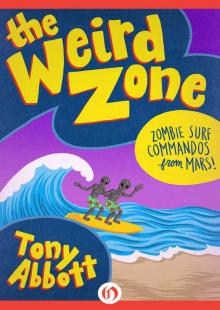 Zombie Surf Commandos from Mars!
Zombie Surf Commandos from Mars!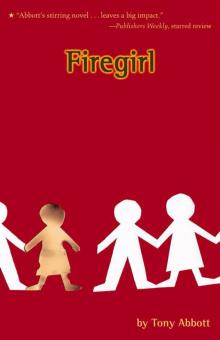 Firegirl
Firegirl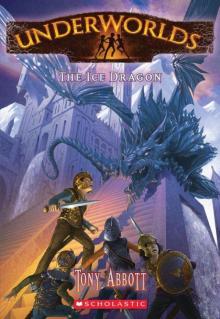 Underworlds #4: The Ice Dragon
Underworlds #4: The Ice Dragon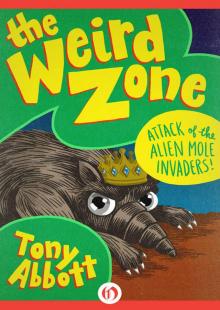 Attack of the Alien Mole Invaders!
Attack of the Alien Mole Invaders!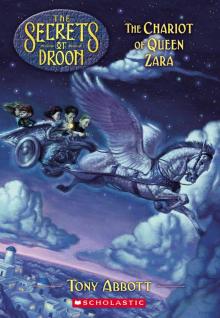 The Chariot of Queen Zara
The Chariot of Queen Zara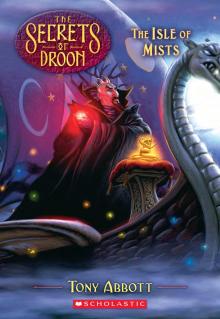 The Isle of Mists
The Isle of Mists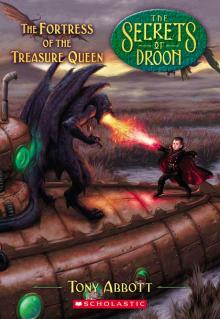 The Fortress of the Treasure Queen
The Fortress of the Treasure Queen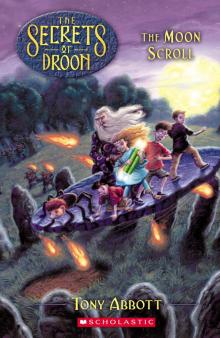 The Moon Scroll
The Moon Scroll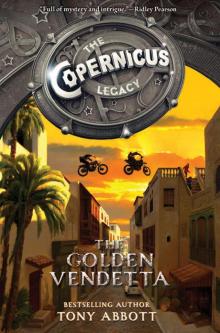 The Golden Vendetta
The Golden Vendetta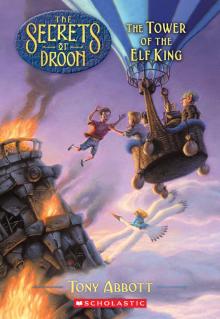 The Tower of the Elf King
The Tower of the Elf King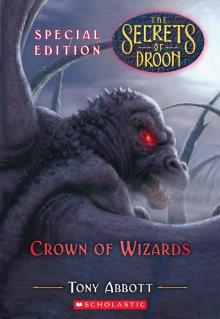 Crown of Wizards
Crown of Wizards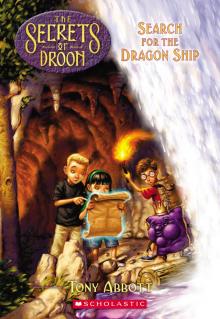 Search for the Dragon Ship
Search for the Dragon Ship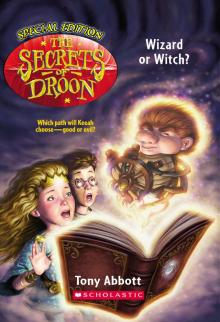 Wizard or Witch?
Wizard or Witch?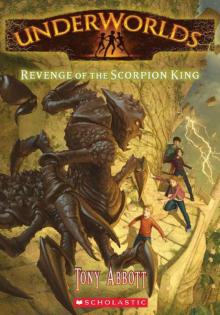 Underworlds #3: Revenge of the Scorpion King
Underworlds #3: Revenge of the Scorpion King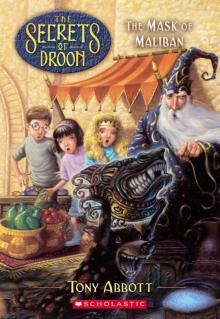 The Mask of Maliban (The Secrets of Droon #13)
The Mask of Maliban (The Secrets of Droon #13)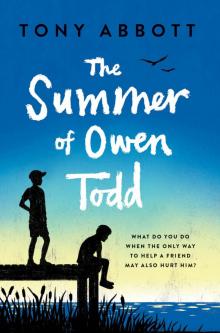 The Summer of Owen Todd
The Summer of Owen Todd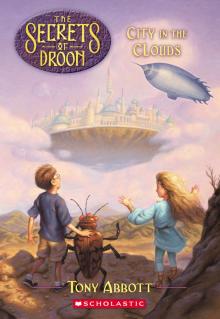 City in the Clouds
City in the Clouds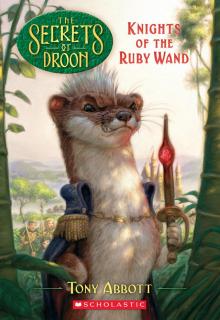 Knights of the Ruby Wand
Knights of the Ruby Wand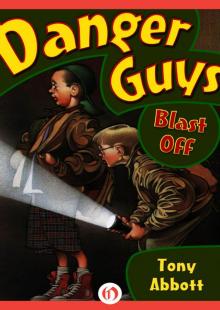 Danger Guys Blast Off
Danger Guys Blast Off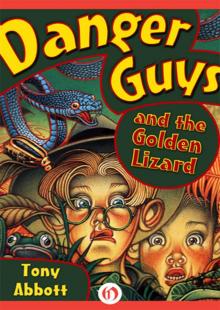 Danger Guys and the Golden Lizard
Danger Guys and the Golden Lizard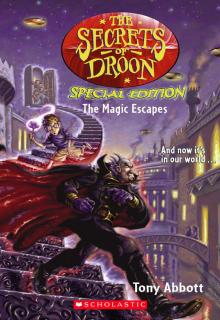 The Magic Escapes
The Magic Escapes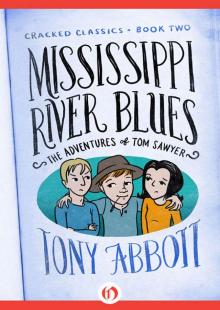 Mississippi River Blues
Mississippi River Blues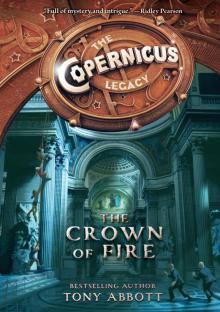 The Crown of Fire
The Crown of Fire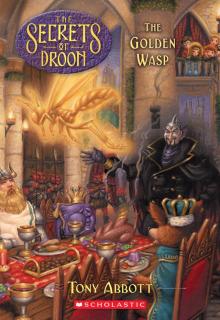 The Golden Wasp
The Golden Wasp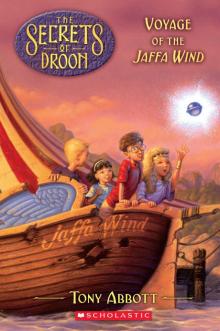 Voyage of the Jaffa Wind (The Secrets of Droon #14)
Voyage of the Jaffa Wind (The Secrets of Droon #14)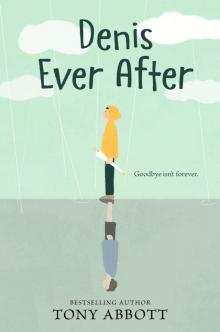 Denis Ever After
Denis Ever After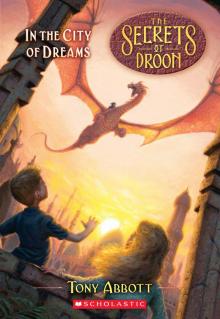 In the City of Dreams
In the City of Dreams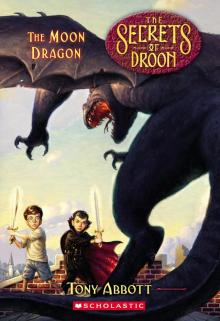 The Moon Dragon
The Moon Dragon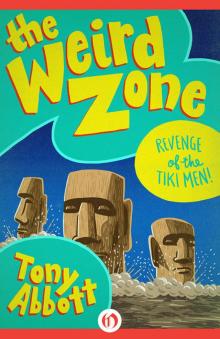 Revenge of the Tiki Men!
Revenge of the Tiki Men!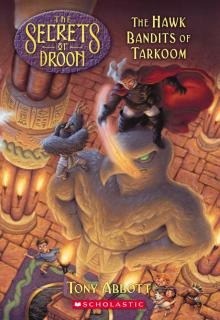 The Hawk Bandits of Tarkoom
The Hawk Bandits of Tarkoom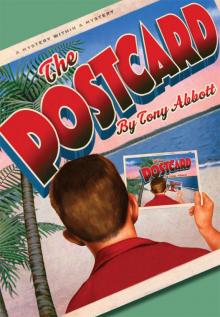 The Postcard
The Postcard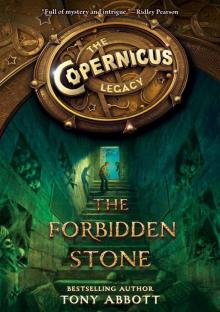 The Copernicus Legacy: The Forbidden Stone
The Copernicus Legacy: The Forbidden Stone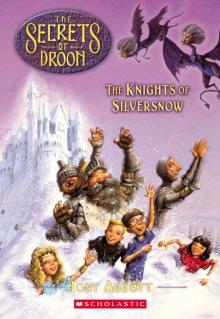 The Knights of Silversnow (The Secrets of Droon #16)
The Knights of Silversnow (The Secrets of Droon #16) Under the Serpent Sea
Under the Serpent Sea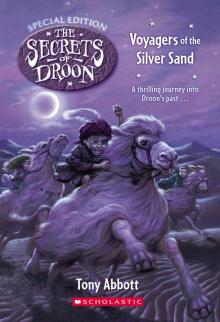 Voyagers of the Silver Sand
Voyagers of the Silver Sand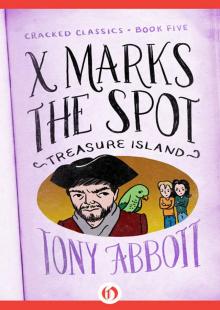 X Marks the Spot
X Marks the Spot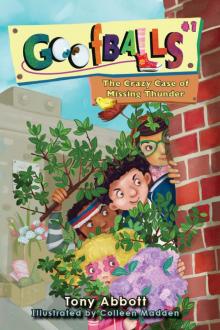 The Crazy Case of Missing Thunder
The Crazy Case of Missing Thunder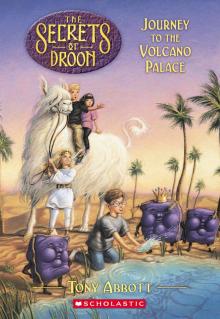 Journey to the Volcano Palace
Journey to the Volcano Palace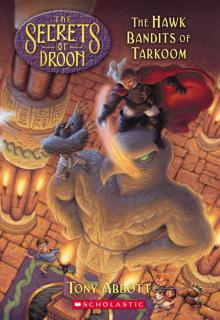 The Hawk Bandits of Tarkoom (The Secrets of Droon #11)
The Hawk Bandits of Tarkoom (The Secrets of Droon #11)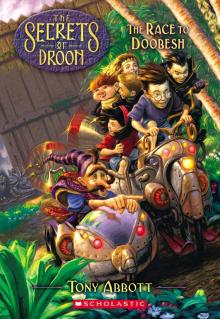 The Race to Doobesh
The Race to Doobesh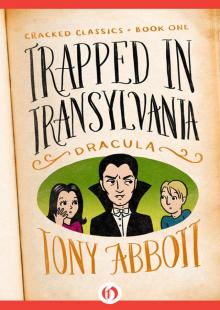 Trapped in Transylvania
Trapped in Transylvania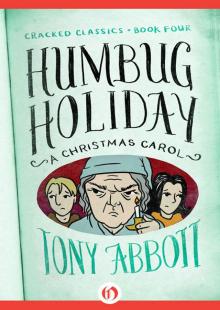 Humbug Holiday
Humbug Holiday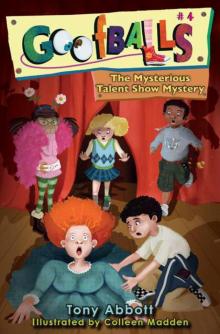 Goofballs 4: The Mysterious Talent Show Mystery
Goofballs 4: The Mysterious Talent Show Mystery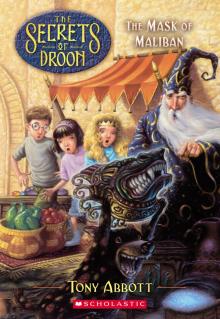 The Mask of Maliban
The Mask of Maliban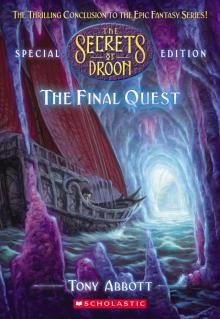 Final Quest
Final Quest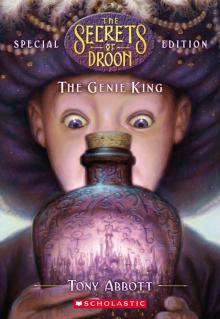 The Genie King
The Genie King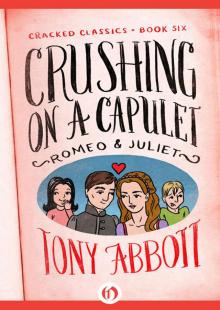 Crushing on a Capulet
Crushing on a Capulet